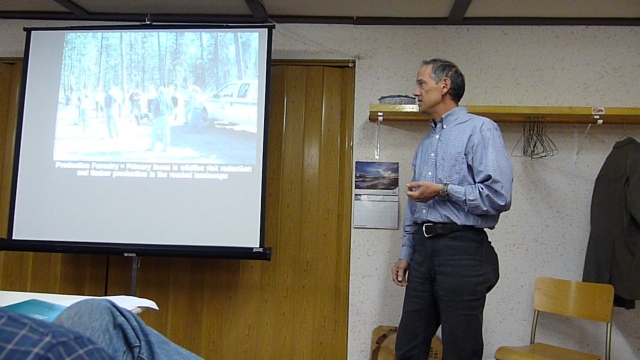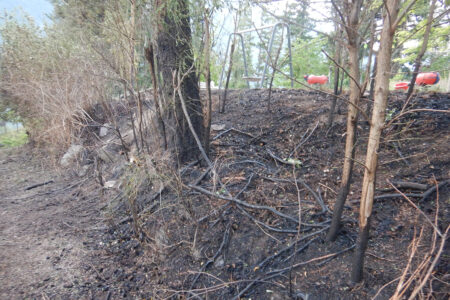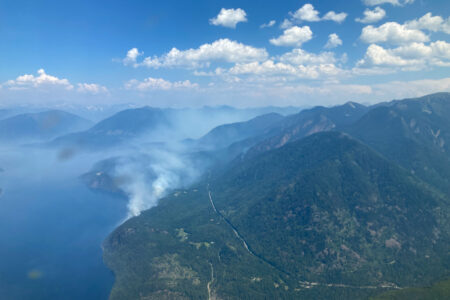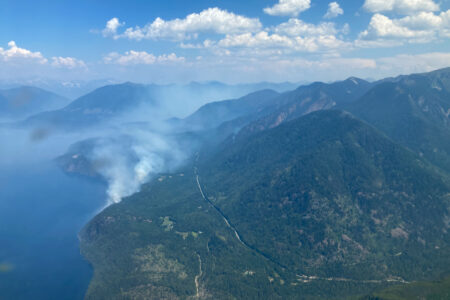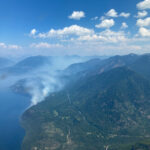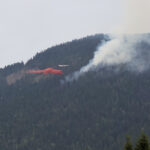Stop the grasslands war: co-operation is the key
Collaboration was the message of a forum discussion about the ecosystems of the Boundary region. In bringing together people on opposing sides of environmental issues in the area to talk and listen, Granby Wilderness Society (GWS) is setting the tone for the work they hope to accomplish in the future. Speakers from B.C. Parks, Conservation Northwest and FORREX presented information about the ecosystems of the Boundary and provided an alternative way to move forward to resolve continual battles that crop up between users of the backcountry. “We made some great connections at the meeting,” said Jenny Coleshill, co-ordinator for the society who wants more people to come forward to develop a working group perhaps similar to the model from Republic area in nearby Washington State. The Columbia Highlands Initiative, a successful collaborative model of land management that has been working together since 2002 in North East Washington, was the topic for Tim Coleman of Conservation Northwest. The group has created an alternative management plan for federal public lands. Since they started working together, there have been no legal challenges to their plans. “It involves a lot of collaboration between community leaders,” explained Coleman. “It’s a story about how we went from fighting to co-operation.” Coleman said the “forest wars” started in the Colville National Forest as far back as the 1970’s. The current coalition includes the timber industry, consideration of wildlife, protection of wilderness areas, recreation and ranching concerns in their planning process. Coleman described their success in using stewardship contracts that guarantee funds come back to the area for restoration and preservation efforts from timber sales, etc. Coleshill’s aim is to put together a grant proposal to the Habitat Conservation Foundation (HCF) to establish partnerships to move forward with projects for the Boundary. Their hope is to submit a full proposal for a multi-year project this year based on input from this forum. “If anyone is interested in coordinating and developing on the ground restoration projects, consider a committee that can work towards those goals,” Coleshill told the audience of 50 that included ranchers, hunters, environmentalists and interested citizens. “We really do have a suite of species at risk here. Gilpin is not the only issue in this community, there’s plenty of others. I’m hoping we can figure out how to move forward all together.” Mike Ladd, parks supervisor in the Okanagan region, talked to the audience about the existing parklands and nature trust lands, and the role of parks in the areas. Between the Boothman / Oxbow park (34 hectares) and the Gilpin Grasslands park (1000 hecatres), there is a set of unique habitat in the riparian areas as well as the dry grasslands. Parks focus is on protection, recreational use without destruction, and managing the heritage values in the parks. “We’re into protecting the grasslands so we’re looking at limiting access for motorized vehicles. We’re looking at trails and opportunities to put in more trails, and trying to deal with access. It’s difficult because there’s not a lot of money around as you all know,” explained Ladd. Don Gayton, extension ecologist with FORREX, has been studying the Boundary’s ecosystems for years. His presentation gave a different perspective to the ongoing challenges that the environment faces in the region. Gayton spends a lot of time examining historical references, books, articles and photographs to determine the past face of an ecosystem. Gayton also monitors six current areas that are range references – completely fenced sections of land – to see what the area would be like without interference. That gives a guage for the damage or potential for an area. “The bottom line is that our direct impacts on ecosystems are far greater than the magnitude of climate change in that same time period,” explained Gayton. “It’s important to keep in mind the previous conditions of ecosystems still has a great deal of relevance to us. Richard Hebda, one of the best climate change specialists in the province says: the best way to prepare for climate change is to get our ecosystems in the best possible health that we can so they have a resilience factor as we get into climate change.” Anyone interested in participating in a collaborative group to start addressing the needs of the Boundary’s lands and wildlife can contact Coleshill through www.granbywildernesss.ca.


